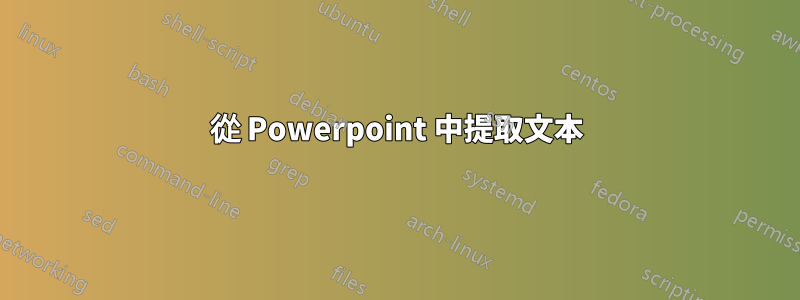
所以,我在這裡找到了這個不錯的腳本: http://www.pptfaq.com/FAQ00274_Export_Text_to_a_text_file-_extract_text_from_PowerPoint_-Mac_or_PC-.htm (我用的是第二個)
導入部分是這樣的:
For Each oShp In oSld.Shapes 'Loop thru each shape on slide
'Check to see if shape has a text frame and text
If oShp.HasTextFrame And oShp.TextFrame.HasText Then
If oShp.Type = msoPlaceholder Then
Select Case oShp.PlaceholderFormat.Type
Case Is = ppPlaceholderTitle, ppPlaceholderCenterTitle
Print #iFile, "Title:" & vbTab & oShp.TextFrame.TextRange
Case Is = ppPlaceholderBody
Print #iFile, "Body:" & vbTab & oShp.TextFrame.TextRange
Case Is = ppPlaceholderSubtitle
Print #iFile, "SubTitle:" & vbTab & oShp.TextFrame.TextRange
Case Else
Print #iFile, "Other Placeholder:" & vbTab & oShp.TextFrame.TextRange
End Select
Else
Print #iFile, vbTab & oShp.TextFrame.TextRange
End If ' msoPlaceholder
Else ' it doesn't have a textframe - it might be a group that contains text so:
If oShp.Type = msoGroup Then
sTempString = TextFromGroupShape(oShp)
If Len(sTempString) > 0 Then
Print #iFile, sTempString
End If
End If
End If ' Has text frame/Has text
Next oShp
我已經對其進行了一些修改,因此輸出檔案不包含“標題”、“其他佔位符”等文本,也不插入製表符(“vbTab”)。但是,它將每一行(或段落)放入輸出檔案中的新行中。
問題:如何告訴腳本將“幻燈片”/“正文”中的所有“內容”轉儲到同一行/單元格中?
我注意到這個腳本(而且這個也不是http://www.pptfaq.com/FAQ00332_Export_Slide_Number_and_Title_Text_to_a_text_file.htm) 對標題表現出此行為,僅適用於「body」或「ppPlaceholderBody」。
我不知道為什麼會這樣或有什麼差別。即使在相同的形狀/盒子中,它是否也無法區分兩條線或公告之間的區別?我的目標是在多個 .ppt 上保持一致的行/單元格編號,以便幻燈片 2 中新增的行不會導致幻燈片 5 中的內容轉移到下一行。
感謝您的幫忙!
答案1
我的 PowerPoint 安裝目前已關閉,因此未經測試。但...
您只需建立一個字串變數並新增到其中,然後在完成投影片後,將該字串複製到 Excel 儲存格中。
Dim slideText As String
For Each oShp In oSld.Shapes 'Loop thru each shape on slide
If Len(slideText) > 0 Then
'--- strip the unneeded trailing CRLF
slideText = Left$(slideText, Len(slideText) - 2)
'--- now copy the string to the appropriate cell in Excel
Else
'--- clear the string for the next slide
slideText = vbNullString
End If
'Check to see if shape has a text frame and text
If oShp.HasTextFrame Then
If oShp.TextFrame.HasText Then
If oShp.Type = msoPlaceholder Then
Select Case oShp.PlaceholderFormat.Type
Case Is = ppPlaceholderTitle, ppPlaceholderCenterTitle
slideText = slideText & "Title:" & vbTab & _
oShp.TextFrame.TextRange & vbCrLf
Case Is = ppPlaceholderBody
slideText = slideText & "Body:" & vbTab & _
oShp.TextFrame.TextRange & vbCrLf
Case Is = ppPlaceholderSubtitle
slideText = slideText & "SubTitle:" & vbTab & _
oShp.TextFrame.TextRange & vbCrLf
Case Else
slideText = slideText & "Other Placeholder:" & _
vbTab & oShp.TextFrame.TextRange & vbCrLf
End Select
Else
slideText = slideText & vbTab & oShp.TextFrame.TextRange
End If ' msoPlaceholder
End If
Else
' it doesn't have a textframe - it might be a group that contains text so:
If oShp.Type = msoGroup Then
sTempString = TextFromGroupShape(oShp)
If Len(sTempString) > 0 Then
slideText = slideText & sTempString & vbCrLf
End If
End If
End If ' Has text frame/Has text
Next oShp
'--- catch the text on the last slide here
If Len(slideText) > 0 Then
'--- strip the unneeded trailing CRLF
slideText = Left$(slideText, Len(slideText) - 2)
'--- now copy the string to the appropriate cell in Excel
End If
當然,您要為每張投影片執行此循環。
答案2
我認為這沒有幫助,但是:https://stackoverflow.com/questions/45468824/printing-from-ppt-vba-to-an-excel-spreadsheet 嘗試使用 Lbound 和 Ubound 進行類似的操作以列印到特定儲存格。
只要單元格在多個 ppt/xls 中保持一致,我真的不知道字串去哪裡...
(雖然它也選擇一個特定的xls 文件,而我想為每次打印輸出創建一個新文件,但這對於我已有的代碼來說應該不成問題,它要么創建指定的文件,要么使用ppt 中的文件名。


